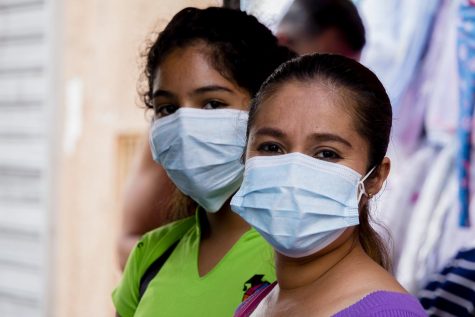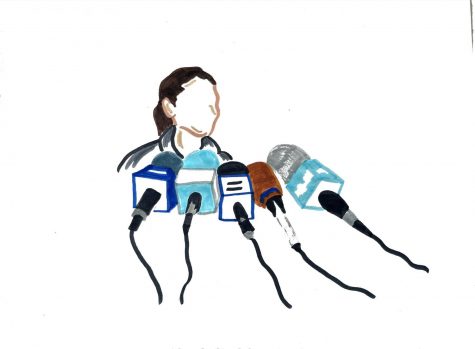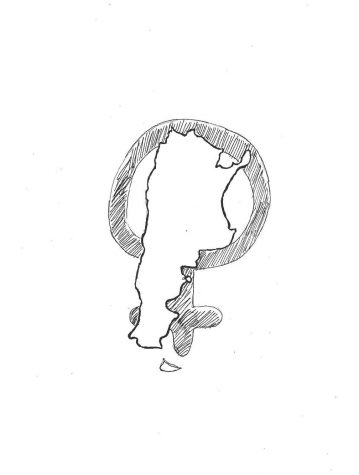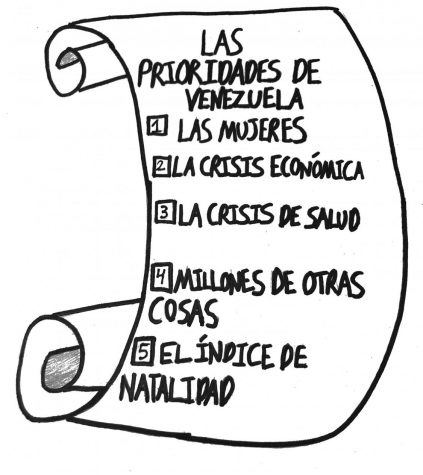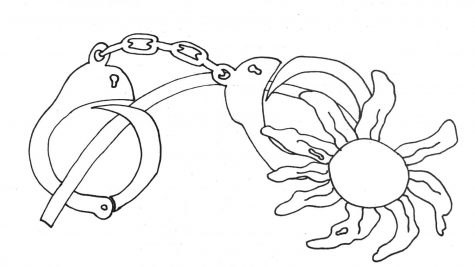Estudiantes reflexionan en un viaje enriquecedor a la República Dominicana
Foto cortesía de David Mota de la Parra
Cavando una zanja, los estudiantes construyen un estanque con peces para la comunidad
April 6, 2020
Durante la semana de esquí, un grupo de casi 30 estudiantes viajaron a la República Dominicana con Todd Van Peursem, un profesor de educación física, y otros acompañantes para hacer trabajo de voluntariado, explorar la cultura y aprender sobre la agricultura sostenible.
Cuando llegaron a la República Dominicana, el grupo fue a un pequeño pueblo que se llama Las Majahuitas, donde se alojaron con familias anfitrionas. Quedarse con gente de la región les dio una oportunidad de descubrir cómo es la vida diaria en la comunidad. La sophomore Katie Connors, quien era parte del grupo, le gustó su tiempo en Las Majahuitas porque los habitantes fueron extremadamente hospitalarios.
“Nos levantaron y ellos nos prepararon el desayuno. Hablamos en espanol con ellos y aprendimos sobre su familia,” dijo Connors. “Estuve sorprendida de ver cómo las familias eran tan abiertas y cómo invitaron a gente que no conocían a sus casas.”
La junior Devon Ball reflejó en cómo su alojamiento en familia le ayudó a integrarse en la cultura dominicana.

La junior Devon Ball con su familia anfitriona en Las Majahuitas, República Dominicana
“Fue una experiencia muy, muy buena porque seguimos sus costumbres, vimos cómo cocinan su comida y construimos amistades con los niños. Siento que mejoré mi espanol,” dijo Ball.
Muchos de los estudiantes no habían hecho un viaje cómo esto, lo que les empujó fuera de su zona de confort. Van Peursem cree que exponer los estudiantes a situaciones que no han encontrado antes fue beneficioso para ellos.
“Cuando llevas los estudiantes a un país extranjero, donde no están acostumbrados a la comida y oyen sonidos que no han oído antes… pueden expresar la vulnerabilidad y entender que está bien [ser vulnerable],” él dijo. “Lo que sale es una conexión humana profunda.”
Van Peursem cree que este grupo es diferente de los otros grupos porque pudieron ser vulnerables con el uno al otro en un periodo de tiempo bastante corto, lo que creó un espacio libre para aprender. Ball, quien hizo el viaje a Ecuador el año pasado, también piensa que el grupo de este año fue especial, y dijo que formó relaciones muchas mas profundas con los estudiantes con quién viajó.
Otra diferencia entre este viaje y el del año pasado es el aspecto de trabajo de voluntariado. Los estudiantes aprendieron mucho más sobre el tipo de voluntariado que estaban haciendo y cómo ayudaría a la gente viviendo en Las Majahuitas. Un proyecto en que trabajaron fue mezclar cemento para construir caminos que llevan a las casas de las familias anfitrionas. Connors lo describió cómo unas de las partes más gratificantes del viaje.
“Construimos caminos que llevan a nuestras casas, luego pudimos ver cómo estábamos ayudando a nuestra familia anfitriona y cómo estábamos haciendo una diferencia en la comunidad,” Connors dijo.
Después de regresar del viaje, las perspectivas de muchos estudiantes sobre sus vidas cotidianas en Redwood han cambiados.
“Siempre hemos hablado del choque que nos causó viajar al nuevo lugar, al nuevo país, pero regresar fue también un choque. Teníamos que acostumbrarnos de nuevo a la vida [en casa] porque nos habíamos acostumbrado a una vida que era tan diferente de la nuestra,” Connors dijo.
De la misma manera, la sophomore Harper Fong dijo que el uso continuo de la tecnología la sorprendió después de regresar.
“Volvimos y todo tenía que ver con la tecnología. Regresamos al aeropuerto y pedimos todo desde tabletas. Fue muy sorprendente,” Fong dijo.
Estos viajes han sido experiencias maravillosas para muchos estudiantes. Jackson Chou era estudiante de Redwood y se graduó hace unos años. Ha estado haciendo viajes con Van Peursem durante casi cinco años, y era unos de los líderes para el viaje a la República Dominicana este año.
“[Estos viajes] han desarrollado no solamente mi idea de viajar, sino cómo percibo el mundo y cómo me veo cómo ciudadano global dentro de este mundo,” Chou dijo.
Estos viajes no lo han solamente enseñado sobre el mundo, sino que lo llevaron a estudiar la sustentabilidad y a viajar en grupo en la universidad. A través de estos viajes está capaz de utilizar lo que está estudiando en la universidad en la vida real.
Después de regresar a casa, todos estos estudiantes recomendarían este viaje a otros.
“Estaba tan nerviosa porque no había salido fuera del país, pero las conexiones que he formado allí eran tan maravillosas; nunca habría conocido a la mitad [de los chicos que he conocido a través de este viaje],” Connors dijo. “Ahora, [son] algunos de mis amigos más íntimos.”

Tomando el aire, los estudiantes reflexionan sobre su viaje hasta ahora
Chou también piensa que los viajes ofrecen experiencias maravillosas.
“No hay muchos momentos en tu vida cuando puedes tomar una semana para tener estas experiencias y a veces estas pequeñas experiencias te pueden cambiar la vida,” Chou dijo.
Cree que los estudiantes deben aprovechar de la oportunidad de viajar a un nuevo lugar aunque sea fuera de sus zonas de confort.
“[Estudiantes] deberían hacer [estos viajes], porque cuando salgas de tu zona de conforta, puedes aprender no solamente sobre ti mismo, sino también sobre la gente alrededor de ti y el mundo alrededor de ti,” Chou dijo.
ENGLISH VERSION:
Over ski week, a group of almost 30 students traveled to the Dominican Republic with physical education teacher Todd Van Peursem and other chaperones to engage in a mix of service, cultural immersion and sustainable agriculture education.
Upon arriving in the Dominican Republic, the group first headed to a small town called Las Majahuitas, where students lived in homestays. The homestays gave them a taste of everyday life in the Dominican Republic. Sophomore Katie Connors, who went on the trip this year, enjoyed staying at her homestay and she found the locals to be extremely welcoming.
“We would wake up and they would make us breakfast. We would speak Spanish with them and learn about their family,” Connors said. “I never expected families to be so open and invite people they didn’t know into their home.”
Junior Devon Ball reflected on how much her homestay helped her immerse in the culture of the Dominican Republic.
“It was a really, really great experience because we got to live in their ways of life, we got to see how they cook their food and we got to really build these relationships with the children. I definitely felt like I improved in my Spanish,” Ball said.
Many of the students had never been on a trip like this before, which put them out of their comfort zone. Van Peursem believes forcing the students out of their comfort zone was beneficial.
“When you place [the students] in a foreign land, with food that they’re not used to and sounds that they’re not used to hearing… they are able to express vulnerability and see that it’s okay [to be vulnerable],” he said. “What can come out of that is deep human connection.”
Van Peursem believes that this group was different from other groups because they were able to be vulnerable with each other in such a short time, which provided a safe space for learning. Ball, who went on the trip to Ecuador last year, also believes that this year’s group was special, and said that on this trip she made much closer connections with the people she traveled with.
Another difference from the last trip was the community service aspect. Students learned a lot more about the type of service they were doing and how it would help the people living in Las Majahuitas. One project they did was mixing cement to make paths to the houses of their homestays. Connors described that as one of the most rewarding parts of the trip.
“We built the paths to our houses, so we could see how we were helping our host family and how we were making a difference in the community,” Connors said.
After coming back from the trip, many students’ perspectives of their daily lives at Redwood have changed.
“We always talked about the shock of going to the new place, the new country, but coming back was [also] a shock. We had to get used to the life [back at home] because we had gotten used to a life that was so different from ours,” Connors said.
Similarly, sophomore Harper Fong said that the constant use of technology shocked her after coming home.
“We came back and everything revolved around technology. We came back to the airport and we ordered everything off of tablets. It was really surprising,” Fong said.
These trips have been amazing experiences to many students at Redwood. Jackson Chou was a student at Redwood who graduated a few years ago. He has been doing trips with Van Peursem for almost five years, and he was one of the leaders on the trip to the Dominican Republic this year.
“[These trips] helped shape my idea of not only traveling, but also of how I perceive the world and how I see myself as a global citizen within that world,” Chou said.
Not only have these trips been able to teach him about the world, they also led him to study sustainability and group travel in college. Through these trips he is able to use what he is studying in college in a real life setting.
After returning home, all these students would recommend this trip to others.
“I was really nervous because I had never been out of the country, but the connections I made there were amazing; I would have never met half of [the kids I met through this trip],” Connors said. “Now, [they are] some of my closest friends.”
Chou also believes that the trips offer amazing experiences.
“There’s not a whole lot of times in your life when you’re able to go off for a week and have these experiences and sometimes those little experiences can be so life-changing,” Chou said.
He believes that students should take advantage of the opportunity to travel somewhere new even if it’s out of their comfort zones.
“[Students] should go on [these trips], because by getting out of your comfort zone, you’re able to learn not only about yourself, but about the people around you and the world around you,” Chou said.










